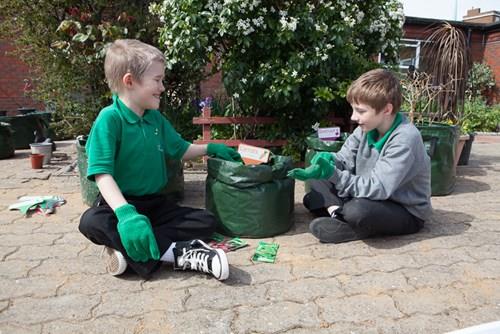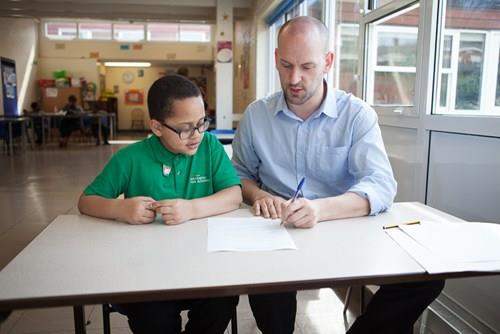Parallel Learning Trust (PLT) consists of seven academies that offer alternative or special provision for children with social emotional or mental health (SEMH) needs, including Kennington Park Academy located in south London. While each academy has its own identity, they are united by a set of shared values:
- Take and create opportunities.
- Take responsibility.
- Be an inspiration.
- Be respectful.
- Engage in transformation.
- Make progress in their social and emotional needs.
- Gain confidence and self-esteem.
- See themselves as active learners.
- Make academic progress.
- Feel included within the community.
- Develop the skills necessary for a successful transition to key stage 3.
- Make progress in relation to the targets in their Education, Health and Care Plans (EHCPs).
Quoting WB Yeats, CEO Mark Jordan describes education as the "lighting of a fire" and says that PLT's schools are committed to developing "thinkers, voters and entrepreneurs, especially within those groups historically excluded by deprivation and low attainment".
Kennington Park Academy provides alternative school provision and support to pupils aged from five to 11 who have been referred by the local authority as permanently excluded pupils or children missing in education.
On site, they also host Oak Park, a specialist setting which has been established to support pupils whose complex SEMH needs mean that they have not been successful in mainstream schools. Pupils may also have secondary needs such as autism spectrum disorder, ADHD and other barriers to learning. The school's vision strives to ensure pupils:
This is a setting that is not without its challenges. On occasion children arrive in crisis; the families and schools they have arrived from require intensive support. Headteacher Anne Sturman described her steps to success at Kennington Park.
1, Develop a collegiate approach
"All adults are responsible for all children, all of the time," Ms Sturman explained. Decision-making is child-centred, from the curriculum to timetabling, assessment arrangements and the organisation of the building.
Offices and classrooms have been re-organised several times in order to consistently meet the needs of the changing cohorts. This has included relocating classes and offices to enable the SEMH provision to be positioned close to the entrance, allowing pupils with complex needs to easily access key parts of the building.
Classrooms have adjoining rooms which are used as a calming measure; pupils can self-select and choose to use these rooms to have some "quiet time", or adults may direct a pupil there to carry out some focused one-to-one work, settling a child and supporting them until they are ready to return to the main classroom.
There is an integrated therapeutic approach, which has influenced the school’s holistic approach to PSHE. PLT has invested in highly skilled therapists who are centrally employed. Kennington Park benefits from a speech and language therapist, a psychotherapist, cognitive behavioural therapy, a therapist dedicated to integrated support (drama/art/play therapy), and talk therapy from the Mary Dolly Foundation.
They have adopted a centralised approach to referral, ensuring all members of the team have the opportunity to raise a concern. Staff believe there is a moral imperative to ensure all children’s needs are met and to facilitate this the whole staff have a short "team debrief" three times a week which promotes reflection and prevention.
Ms Sturman explained: "This is an invaluable time for the staff. We use it as a problem-solving opportunity, it’s a safe space for staff to trouble-shoot potential issues and learn from events that have already taken place."
The debrief meetings also act as supervision for the staff so they are well supported. Therapists and visiting practitioners also attend as they hold crucial information about pupils’ wellbeing and they can support the team in devising strategies for vulnerable pupils and families. The frequency of the meetings ensures swift intervention can be put into place.
In addition, regular meetings are held with a range of multi-agency practitioners including CAMHS, educational psychologists, early help, the PLT therapists, the SENCO, and the senior leadership team. The SENCO and a member of leadership team create a case list which is sent to attendees two weeks in advance. This contains specific details relating to each pupil, including a diagnosis if known and agreed actions moving forwards.
Like in other settings, Kennington Park often receives little information about pupils in advance of their arrival. Meeting regularly with professionals to share vital information about family history, academic, social and emotional needs helps practitioners to put the appropriate support in place and creates equity of provision over time.


2, Make every moment matter
Through discrete teaching and a comprehensive cross-curricular approach, pupils have multiple opportunities to enjoy and explore the PSHE curriculum. This is complemented by the team’s high-quality interactions with pupils during "down time" – walking to and from lessons, in the playground and during breakfast club – modelled by the leaders at all levels. It is a poignant reminder that each moment is a "teachable moment".
The relationship between the integrated therapeutic services and the PSHE curriculum is clear. The consistent use of language to develop pupils’ resilience, sense of self and belonging in the world is striking. Timetabling, staff deployment and use of space is carefully though- out to promote pupils’ health and wellbeing.
This is complemented by a curriculum which enables pupils to safely explore relationships and life in the wider world. The timetable includes wraparound activities such as the soft start to the day, a communal breakfast and a short play at 9:10am which enables pupils travelling from further afield to arrive, settle and start lessons at the same time as the rest the school community. The notion of family extends throughout the school setting and "Oak" pupils in the SEMH setting are referred to as Kennington Park cousins, included in as many of the whole-school activities as possible.
3, Accountability is key
The children at Kennington Park are remarkably empathetic and keen to learn about each other’s similarities and differences. When pupils do not arrive with these learned behaviours, Ms Sturman is quick to point out the role of teachers and learning advisors: "When relationships between pupils break down, it is our responsibility as adults to repair them, to empower pupils when they do not have the skills to do this for themselves."
The school leadership has developed a culture where adults and pupils are accountable to one another. Subsequently pupils are supported as they reintegrate back into mainstream and engage as citizens in the wider world.
Ms Sturman and her team are eager to understand which aspects of the PSHE curriculum and therapeutic services are working well and why. In addition to traditional methods such as regular pupil progress meetings, the school uses the Social Independence Scale (SIS), a tool developed by the trust for measuring pupil’s personal growth across five key areas: resilience, emotions, self-esteem, communication and managing self.
The scale consists of 25 can-do statements. Teachers focus on a different statement each term and deliver this theme daily through the curriculum. For example, in the autumn term "resilience" was taught in all lessons including PE. In keeping with the school’s ethos of collective responsibility, all therapists also have access to the SIS enabling them to provide valuable insight on how to support pupils with complex needs.
Analysis of the information inputted into SIS provides the team with a deep understanding of which teaching and learning strategies and therapeutic interventions are working well and why (an area traditionally very difficult to capture). Perhaps more surprisingly, the SIS is now being used by the trust in a particularly innovative way to predict patterns of behaviour over time, enabling teams to look closely at preventive strategies.
Kennington Park also places equal emphasis on the delivery of character education, developing pupils’ spiritual, moral, social, and cultural (SMSC) awareness, preparing them for the opportunities, responsibilities and experiences of later life. Strategically designed curriculum maps outline how the school’s approach to character education and PSHE demonstrate progression and coverage so that learning experiences are complementary.
Ms Sturman concluded: "Our staff are all united in the belief that there is no such thing as ‘bad’ behaviour or a ‘bad child’, rather there is a set of unidentified needs that have not been met yet. We have an obligation to change that."
- Laura McPhee is an experienced headteacher and education consultant. She is committed to furthering the cause of disadvantaged young people and carries out policy consultancy for national social justice charity Nacro, providers in education, housing and criminal justice. Visit www.nacro.org.uk
